The software industry in Pakistan is experiencing remarkable growth, with IT exports reaching $3.2 billion in 2025 a 24% year-on-year increase, as reported by the Pakistan Software Export Board (PSEB).
Pakistan’s software houses are earning international recognition for their innovation, strong portfolios, and skilled IT professionals.
Table of Contents
ToggleFrom enterprise solutions to cutting-edge startups, these companies are serving both local and global clients with excellence.
Key tech cities are driving this momentum Islamabad hosts top-performing software houses, Karachi is home to corporate giants.
Lahore leads the startup wave, Faisalabad brings emerging tech talent, Multan is growing as a regional IT hub with promising software houses, and Peshawar is quickly rising with an innovation-led ecosystem.
We feature the Top 18 Software Houses and Companies in Pakistan (2025), chosen for their performance, client impact, awards, and industry reputation companies truly shaping the future of Pakistan’s digital economy.
Top 18 Best Software Houses and Companies in Pakistan 2025
| Company Name | Founder(s) | Year Established | Location (HQ/PK) | Employees | Core Services |
|---|---|---|---|---|---|
| Systems Limited | Aezaz Hussain | 1977 | Lahore | 7,000+ | Digital Transformation, Data & AI, Cloud |
| Netsol Technologies | Najeeb & Naeem Ghauri | 1997 | Lahore | 1,136 | IT Consultancy, GRC, Managed IT |
| Techlogix | Salman Akhtar, Kewan Khawaja | 1996 | Lahore / USA | 500+ | Digital Transformation, Consulting, Cloud & AI |
| TRG (The Resource Group) | Zia Chishti | 2003 | Karachi | 4,000+ | BPO, Software Development, IT Services |
| Folio3 | Adnan Lawai | ~2005 | Karachi / USA | 500+ | E-commerce, AI, Cloud, Mobile Apps, ERP |
| CureMD | Javed Zahoor, Kamal Hashmat | 1997 | Lahore / USA | 1,000+ | Healthcare IT, EHR, Telemedicine |
| Arbisoft | Yasser Bashir | 2007 | Lahore / USA | 1,000+ | AI, Data Science, Mobile & Web Dev |
| 10Pearls | Imran & Zeeshan Aftab | 2004 | Karachi / USA | 1,500+ | AI/ML, Blockchain, Cybersecurity, UX/UI |
| Arpatech | Jamal Khan | 2003 | Karachi (Global Offices) | 201 to 500 | Software Dev, BPO, Cloud, Digital Marketing |
| Ovex Technologies | Omar Saeed | 2009 | Lahore | 201 to 500 | BPO, IT Outsourcing, Web & Mobile Dev |
| IBM Pakistan | Charles R. Flint (Global) | 1911 (1990s PK) | Karachi | N/A | Cloud, AI, Blockchain, Security |
| Oracle Pakistan | Larry Ellison et al. | 1977 (2000s PK) | Karachi / Islamabad | Global 160,000 | Cloud, Database, ERP, Consulting |
| Technofies | Muhammad Eassa | 2021 | Islamabad | 40+ | Digital Marketing, SEO, Web & App Dev |
| SAP Pakistan | Dietmar Hopp & Co. | 1972 (2000s PK) | Karachi / Islamabad | 100 to 300 | ERP, HR, Finance, Analytics |
| Bentley Systems Pakistan | Greg Bentley | 1984 | Islamabad | 101 to 200 | Infrastructure, CAD, Project Mgmt Software |
| Teradata Pakistan | Jack E. Sheehan | 1979 | Islamabad, Lahore | 300 | Data Analytics, Cloud, Consulting |
| Ericsson Pakistan | Lars M. Ericsson | 1876 (PK ops later) | Islamabad, Lahore, Karachi | 400 | Telecom, 5G, IoT, Cloud |
| DPL | Syed Ahmad, Adnan Javed | 2003 | Islamabad | 51 to 200 | Custom Software, DevOps, Cloud, AI/ML |
Here’s a detailed overview of the top 18 software houses and companies in Pakistan in 2025.
1. Systems Limited
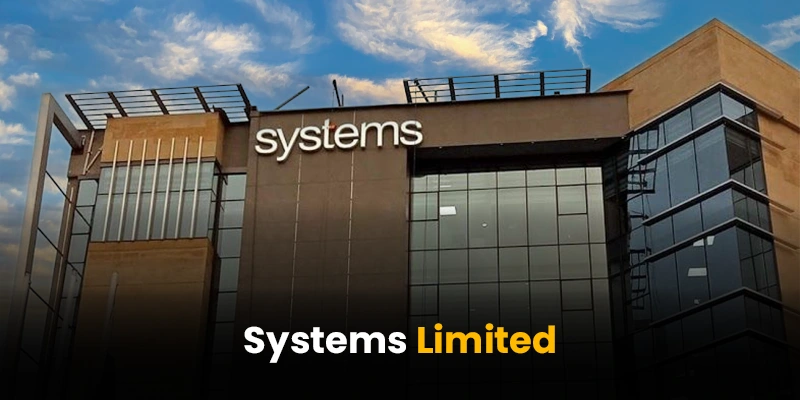
| Attribute | Details |
|---|---|
| Software House Name | Systems Limited |
| Founder(s) | Aezaz Hussain |
| Year Established | 1977 |
| Location in Pakistan | Lahore, Punjab |
| Number of Employees | Approximately 7,000+ |
| Core Services Offered | Digital Transformation, Data & AI, Cloud Services |
| Technologies Used | Node.js, Java, Google Ads Conversion Tracking, among others |
| Clients/Industries Served | Banking & Finance, Telecommunications, Government, Information Technology, Consumer Products & Services |
| Website Link | systemsltd.com |
| Contact Information | Email:info@systemsltd.com
Phone: +92 (42) 111-797-836 |
Industry Reputation
Renowned for its comprehensive software solutions and consultancy services, Systems Limited has established itself as a leader in the Pakistani software industry.
Client Reviews
Widely praised for its professionalism, reliability, and ability to deliver high-quality solutions within agreed timelines.
Project Diversity
Systems Limited has a diverse portfolio encompassing enterprise resource planning (ERP), customer relationship management (CRM), business process outsourcing (BPO), and e-commerce solutions.
Trends and Innovations
Known for adopting cutting-edge technologies such as artificial intelligence (AI), machine learning (ML), and blockchain to enhance its offerings and stay ahead of industry trends.
2. Netsol Technologies
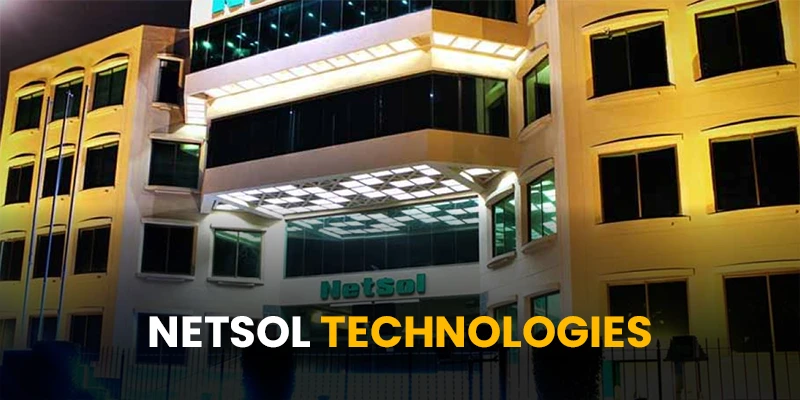
| Attribute | Details |
|---|---|
| Software House Name | NETSOL Technologies |
| Founder(s) | Najeeb Ghauri and Naeem Ghauri |
| Year Established | 1997 |
| Location in Pakistan | Lahore, Punjab |
| Number of Employees | Approximately 1,136 as of June 30, 2024. The number of employees decreased by about 25% from the previous year |
| Core Services Offered | IT Consultancy, Governance, Risk Management, Compliance (GRC), Managed IT Services |
| Technologies Used | Not publicly specified; focuses on financial applications and digital transformation solutions |
| Clients/Industries Served | Finance and leasing industry, serving over 200 companies in more than 30 countries |
| Website Link | netsolpk.com |
| Contact Information | Email:careers@netsoltech.com
Phone: (042) 111 448 800 |
Industry Reputation
Netsol Technologies is globally recognized for its expertise in providing innovative solutions for the finance and leasing industry.
Client Reviews
Clients commend Netsol for its domain knowledge, software reliability, and exceptional customer support.
Project Diversity
Specializes in developing and implementing end-to-end software solutions for asset finance, leasing, and lending sectors.
Trends and Innovations
Continuously invests in research and development to integrate emerging technologies like cloud computing, IoT, and big data analytics into its software offerings.
3. Techlogix

| Attribute | Details |
|---|---|
| Company Name | Techlogix |
| Founder(s) | Salman Akhtar and Kewan Khawaja. |
| Year Established | 1996 |
| Headquarters Location | Woburn, Massachusetts, USA |
| Number of Employees | Approximately 500+ employees |
| Core Services Offered | IT Services, Consulting, Business Solutions, Digital Transformation, API & Integration Services, Application Services, Business Process Management, Cloud Transformation, Data Analytics & AI, Enterprise Mobility |
| Technologies Used | Not publicly specified; focuses on emerging technologies such as AI, Blockchain, and Cloud |
| Clients/Industries Served | Financial Industry, Healthcare, among others |
| Website Link | techlogix.com |
| Contact Information | Email: info@techlogix.com
Phone: +92 51 111 859 859 |
Industry Reputation
Techlogix is highly regarded for its digital transformation services, including custom software development, data analytics, and cloud solutions.
Client Reviews
Known for its collaborative approach, responsiveness, and ability to deliver scalable solutions tailored to client needs.
Project Diversity
Offers a wide range of services spanning multiple industries, including healthcare, banking, telecommunications, and retail.
Trends and Innovations
Pioneering initiatives in areas such as digital banking, healthcare IT, and smart city solutions, leveraging emerging technologies to drive innovation.
4. TRG (The Resource Group)

| Attribute | Details |
|---|---|
| Company Name | The Resource Group (TRG) |
| Founder(s) | Zia Chishti |
| Year Established | 2003 |
| Headquarters Location | Karachi, Pakistan |
| Number of Employees | TRG employs around 4,000 people across its operations |
| Core Services Offered | Venture capital investments in technology and IT-enabled service sectors, focusing on business process outsourcing companies |
| Technologies Used | Focuses on investments in technology and IT-enabled services |
| Clients/Industries Served | Business process outsourcing sector, technology, and IT-enabled services industries |
| Website Link | trg.com.pk |
| Contact Information | Email:investor.relations@trg.com.pk
Phone:+92 21 111 874 874 |
Industry Reputation
TRG is recognized for its comprehensive outsourcing solutions, including software development, business process outsourcing, and IT consulting.
Client Reviews
Clients appreciate TRG’s global presence, operational excellence, and commitment to delivering value-added services.
Project Diversity
Offers a diverse portfolio of services across multiple industries, with a focus on providing scalable and cost-effective solutions.
Trends and Innovations
Embracing automation, AI-driven analytics, and robotic process automation (RPA) to optimize business processes and enhance operational efficiency.
5. Folio3

| Attribute | Details |
|---|---|
| Company Name | Folio3 |
| Founder(s) | Adnan Lawai Adnan |
| Year Established | Over 15 years ago |
| Headquarters Location | Belmont, California, USA. |
| Number of Employees | serves Fortune 500 companies, enterprises, and startups. |
| Core Services Offered | Digital transformation services, strategy consulting, mobile and web app development, AI solutions, cloud solutions, e-commerce development, ERP solutions, and more. |
| Technologies Used | Expertise in mobile app development (iOS, Android), web development, enterprise applications, AI, cloud computing, and emerging technologies. |
| Clients/Industries Served | Entrepreneurs, Fortune 500 companies, enterprises, startups, and prestigious brands across various industries including automotive, retail, healthcare, logistics, agriculture, education, pharmaceuticals, and life sciences. |
| Website Link | folio3.com |
| Contact Information | Email: info@folio3.com
Phone:+92-21-3432 3721-4 |
Industry Reputation
Folio3 is known for its expertise in e-commerce development, mobile app development, and enterprise software solutions.
Client Reviews
Recognized for its technical proficiency, creative solutions, and seamless project management.
Project Diversity
Offers a wide range of services catering to various industries, including retail, healthcare, education, and logistics.
Trends and Innovations
Focused on delivering omnichannel experiences, integrating IoT and AR/VR technologies, and enhancing cybersecurity measures.
6. CureMD

| Attribute | Details |
|---|---|
| Company Name | CureMD |
| Founder(s) | Javed Zahoor and Kamal Hashmat in 1997. |
| Year Established | 1997 |
| Headquarters Location | 120 Broadway, 35th Floor, New York, NY 10271. |
| Number of Employees | serves healthcare organizations of all sizes. |
| Core Services Offered | Electronic Health Records (EHR), Practice Management, Medical Billing Services, Telemedicine, Patient Portal, and Specialty EHR solutions. |
| Technologies Used | Cloud-based platforms, AI integrations, mobile applications (iOS and Android), and compliance with healthcare industry standards. |
| Clients/Industries Served | Healthcare providers, including physicians, specialists, and healthcare organizations across the United States. |
| Website Link | curemd.com |
| Contact Information | Email: info@curemd.com
Phone: +1 866-643-8367. |
Industry Reputation
CureMD is a leading provider of cloud-based electronic health records (EHR), practice management, and medical billing solutions.
Client Reviews
Highly praised for its user-friendly interface, interoperability, and comprehensive features tailored to healthcare providers.
Project Diversity
Specializes in healthcare IT solutions, serving medical practices, hospitals, and healthcare organizations worldwide.
Trends and Innovations
Innovating in telemedicine, interoperability standards, and AI-driven healthcare analytics to improve patient outcomes and optimize healthcare delivery.
7. Arbisoft
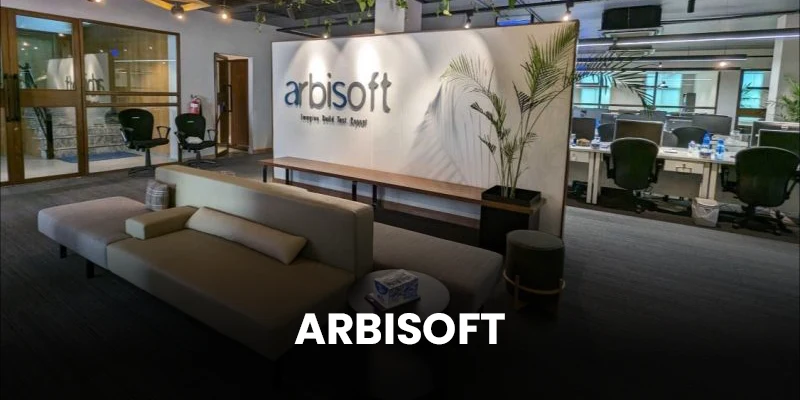
| Attribute | Details |
|---|---|
| Company Name | Arbisoft |
| Founder(s) | Yasser Bashir |
| Year Established | 2007 |
| Headquarters Location | Plano, Texas, USA. |
| Number of Employees | Over 1,000 professionals worldwide. |
| Core Services Offered | Application Development & Testing, DevOps, Data Analytics Services, Rapid Application Development, Enterprise Applications, 3D Applications, Mobile App Development, Automated Data Scraping, Cloud Applications, Data Services, SaaS, Python, Web App Development, Software Quality Assurance, Custom Software Development, Dedicated Team, AI and ML. |
| Technologies Used | Expertise in Python, AI, ML, SaaS, and various web and mobile technologies. |
| Clients/Industries Served | Market leaders across various verticals, including Edtech, Travel, Healthcare, Finance, and E-commerce. |
| Website Link | arbisoft.com |
| Contact Information | Email: info@arbisoft.com
Phone: +1 214-856-3756 |
Industry Reputation
Arbisoft is renowned for its expertise in software development, data science, and machine learning solutions.
Client Reviews
Known for its technical excellence, agility, and collaborative approach in delivering innovative solutions.
Project Diversity
Offers services across various domains, including education, finance, agriculture, and social impact sectors.
Trends and Innovations
Investing in natural language processing (NLP), computer vision, and predictive analytics to develop cutting-edge solutions for its clients.
8. 10Pearls
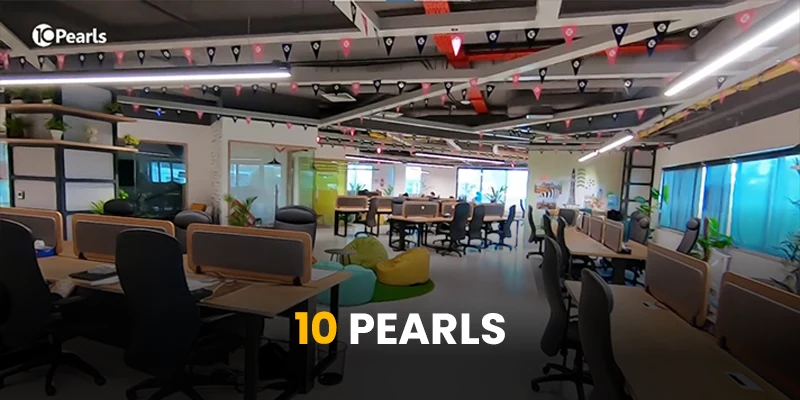
| Attribute | Details |
|---|---|
| Company Name | 10Pearls |
| Founder(s) | Imran Aftab and Zeeshan Aftab |
| Year Established | 2004 |
| Headquarters Location | Washington, DC, USA. |
| Number of Employees | Serves Global 2000 enterprises, high-growth mid-size businesses, and startups across various industries. |
| Core Services Offered | Product design, development, and technology acceleration, including expertise in AI/ML, Blockchain, IoT, NLP, AR/VR, product management, UI/UX, cloud architecture, software development, data insights, cybersecurity, and quality assurance. |
| Technologies Used | Expertise in AI/ML, Blockchain, IoT, NLP, AR/VR, cloud architecture, software development, data insights, cybersecurity, and quality assurance. |
| Clients/Industries Served | Global 2000 enterprises, high-growth mid-size businesses, and startups across industries such as healthcare, financial services, energy, education, real estate, retail, and hi-tech. |
| Website Link | 10pearls.com |
| Contact Information | Email info@10pearls.com
Phone: +1-703-935-1919 |
Industry Reputation
10Pearls is recognized for its digital transformation services, including product development, UX/UI design, and digital marketing.
Client Reviews
Valued for its strategic guidance, agile methodologies, and commitment to delivering impactful solutions.
Project Diversity
Provides end-to-end services to clients across industries such as healthcare, finance, retail, and technology.
Trends and Innovations
Focused on AI-driven personalization, immersive experiences, and blockchain solutions to address evolving business needs.
9.Arpatech (Pvt) Ltd

| Attribute | Details |
|---|---|
| Company Name | Arpatech (Pvt) Ltd |
| Founder(s) | Jamal Khan |
| Year Established | 2003 |
| Headquarters | Karachi, Pakistan |
| Additional Offices | Lahore, Rawalpindi, Islamabad (Pakistan); Dubai (UAE); Cranbrook (UK); New York (USA) |
| Number of Employees | 201-500 employees |
| Core Services Offered | Software Development (Web & Mobile Apps), Cloud & DevOps Services, Business Process Outsourcing (BPO), IT Support & Managed Services, Digital Marketing, Startup Incubation & Venture Support |
| Technologies Used | PHP, Python, Java, JavaScript, Node.js, AngularJS, ReactJS, Vue.js, Laravel, Django, Magento, WordPress, HTML5, CSS3, MySQL, MongoDB, Android, iOS, Bootstrap, CodeIgniter, Yii, Drupal, BigCommerce, CakePHP, Zend |
| Clients/Industries Served | Financial Services, Healthcare, Communications, Energy, Transportation, Consumer & Retail, Startups |
| Website | arpatech.com |
| Contact Email | sales@arpatech.com |
| Phone Numbers |
|
Industry Reputation
Arpatech is recognized as one of the top Software Houses and Companies in Pakistan, known for its reliability and global service delivery.
With a solid reputation in the software development landscape, Arpatech has built trust among international clients and is known for its efficient solutions and dedicated services.
Client Reviews
The company consistently receives positive feedback from its clients, with praise for its professionalism, technical expertise, and timely project delivery. Clients highlight the team’s ability to meet deadlines and deliver innovative solutions that align with industry standards.
Project Diversity
Arpatech has a wide-ranging portfolio that includes projects in various industries such as:
-
eCommerce
-
Fintech
-
Healthcare
-
Logistics
-
Startups
This diversity underscores the company’s ability to provide tailored solutions for different business needs and market demands.
Trends & Innovations
Staying ahead of the curve, Arpatech is deeply involved in cutting-edge technologies. The company focuses on:
-
Cloud Computing
-
DevOps
-
Digital Transformation
By embracing these trends, Arpatech remains a competitive force in the ever-evolving world of Software Houses and Companies in Pakistan.
10. Ovex Technologies
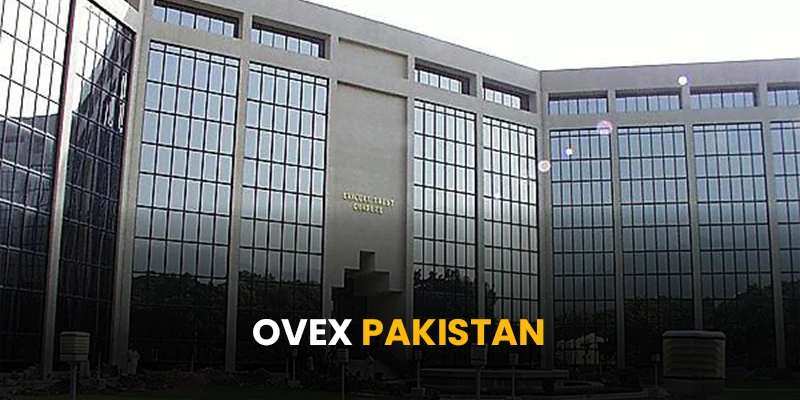
| Attribute | Details |
|---|---|
| Company Name | Ovex Technologies Pakistan (Pvt.) Ltd. |
| Founder(s) | Omar Saeed |
| Year Established | 2009 |
| Headquarters Location | Lahore, Punjab, Pakistan. |
| Number of Employees | Approximately 201-500 employees. |
| Core Services Offered | Business Process Outsourcing (BPO), IT Solutions, Contact Center Outsourcing, IT Outsourcing, Software Development, Accounting Outsourcing, Web Development, Mobile App Development, Customer Support, among others. |
| Technologies Used | Expertise in web and mobile development technologies, data products, and services. |
| Clients/Industries Served | Businesses and brands worldwide, including Fortune 500 companies, FMCGs, financial sectors, and government sectors. |
| Website Link | ovextech.com |
| Contact Information | Email: Info@ovextech.com
Phone: (+92-42-389-00004) (0321 5000990) |
Industry Reputation
Ovex Technologies is known for its IT outsourcing services, including software development, technical support, and infrastructure management.
Client Reviews
Appreciated for its cost-effective solutions, round-the-clock support, and adherence to quality standards.
Project Diversity
Offers a diverse portfolio of services to clients across industries, including telecommunications, hospitality, and education.
Trends and Innovations
Embracing cloud migration, DevOps practices, and cybersecurity enhancements to deliver scalable and secure IT solutions to its clients.
11. IBM Pakistan

| Attribute | Details |
|---|---|
| Company Name | International Business Machines Corporation (IBM) |
| Founder(s) | Charles Ranlett Flint |
| Year Established | 1911 globally; IBM has been operating in Pakistan since the 1990s. |
| Location in Pakistan | Karachi, Sindh(Address: 1st Floor, Darul Hina Building, Tayabjee Road, Near Burhani Hospital, Karachi 74000, Sindh, Pakistan) |
| Number of Employees | Not publicly specified; IBM has a significant presence in Pakistan with multiple offices. |
| Core Services Offered | IT solutions, cloud computing, cognitive analytics, Internet of Things (IoT), customer experience management, security services, and more. |
| Technologies Used | IBM Cloud, IBM Watson, IBM Security, IBM Analytics, IBM Blockchain, and various enterprise solutions. |
| Clients/Industries Served | Banking and finance, telecommunications, manufacturing, small and medium-sized businesses (SMBs), and other sectors. |
| Website Link | ibm.com |
| Contact Information | Email:info@hr.ibm.com
Phone: (+92-21-111-426-725) (+385-1-6110-095) |
Industry Reputation
IBM Pakistan is a major player in the software industry, recognized for offering a diverse range of solutions and services, including cloud computing, artificial intelligence, and blockchain technologies.
Client Reviews
Known for its commitment to delivering advanced technological solutions, IBM Pakistan is appreciated for fostering digital transformation and innovation across various sectors.
Project Diversity
IBM Pakistan collaborates with global partners to offer a wide array of innovative solutions, addressing complex business challenges and contributing to sustainable growth.
Trends and Innovations
The company leverages cutting-edge technologies, including artificial intelligence and blockchain, to drive advancements in digital transformation, further positioning itself as a leader in the tech space.
12. Oracle Pakistan
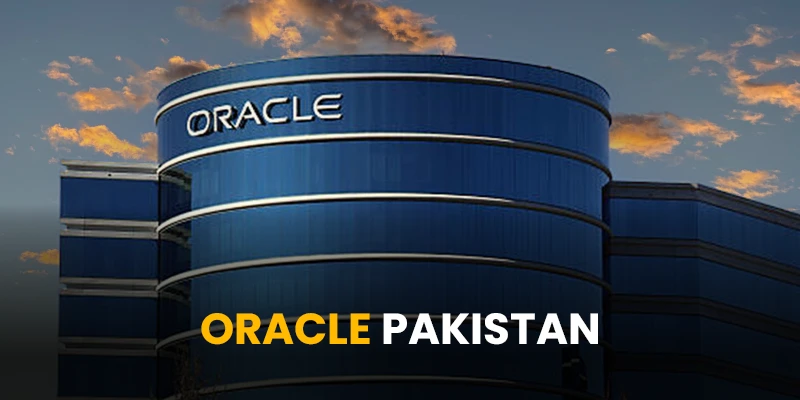
| Attribute | Details |
|---|---|
| Company Name | Oracle Systems Pakistan (Pvt) Ltd. |
| Founder(s) | Larry Ellison, Bob Miner, Ed Oates (Founded Oracle in 1977 globally). |
| Year Established | 1977 globally; operations in Pakistan began in the early 2000s. |
| Location in Pakistan | Islamabad, Karachi |
| Number of Employees | has 160,000 employees worldwide. |
| Core Services Offered | Cloud applications, database management, enterprise software solutions, analytics, and consulting. |
| Technologies Used | Oracle Cloud, Oracle Database, Java, Middleware. |
| Clients/Industries Served | Financial services, telecommunications, government, manufacturing, retail. |
| Website Link | oracle.com |
| Contact Information | Islamabad Office: +92 51 2099799
Karachi Office: +92 21 35893999 Email:salesinquiry_pk@oracle.com |
Industry Reputation
Oracle Pakistan is a leading provider of enterprise software solutions, offering databases, cloud applications, and infrastructure technologies that serve a wide range of industries and businesses of all sizes.
Client Reviews
Oracle Pakistan is valued for empowering businesses to improve productivity, innovation, and strategic decision-making by delivering reliable and cutting-edge enterprise software solutions.
Project Diversity
With a comprehensive portfolio of cloud-based solutions, Oracle Pakistan works with various clients, partners, and developers, promoting best practices and supporting diverse business needs across multiple industries.
Trends and Innovations
Oracle Pakistan is at the forefront of digital transformation initiatives, leveraging advanced technologies and cloud solutions to drive innovation and help organizations achieve their long-term strategic goals.
13. Technofies
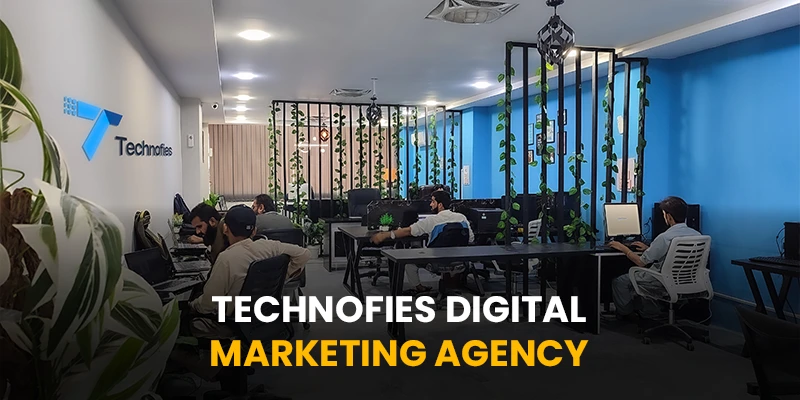
| Attribute | Details |
|---|---|
| Software House Name | Technofies |
| Founder(s) | Muhammad Eassa |
| Year Established | 2021 |
| Location | Islamabad, Pakistan |
| Number of Employees | 40+ |
| Core Services | Digital Marketing, SEO, SMM, SEM, Web & App Development |
| Technologies Used | Latest digital & IT solutions |
| Clients/Industries | Various industries focusing on digital presence |
| Website | Link |
| Contact | Email: info@technofies.com
Phone: +92 334 1414195 |
Industry Reputation
Technofies Digital Marketing Agency is recognized as a leading provider of innovative digital marketing solutions, helping businesses enhance their online presence, engage with customers effectively, and drive measurable results.
Client Reviews
Clients praise Technofies for its strategic approach and personalized service, noting significant improvements in brand visibility and customer engagement as a result of their tailored digital marketing campaigns.
Project Diversity
The agency offers a comprehensive range of services, including search engine optimization (SEO), social media marketing, content creation, and pay-per-click advertising, catering to various industries and business sizes.
Trends and Innovations
Technofies stays ahead of digital marketing trends by leveraging data analytics and emerging technologies to deliver innovative strategies that align with evolving consumer behaviors and market dynamics.
14. SAP Pakistan
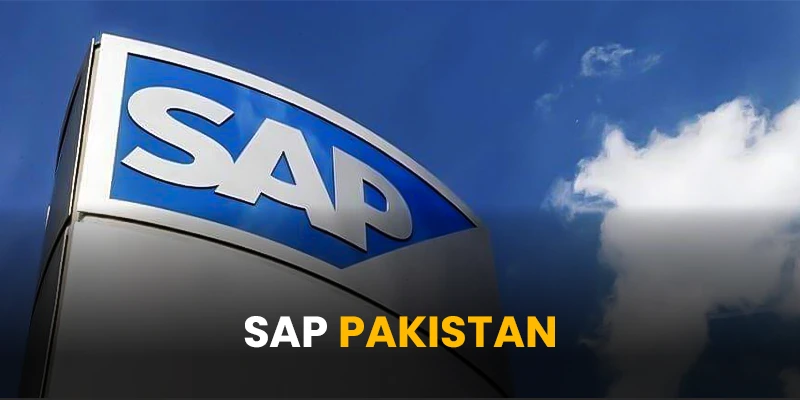
| Attribute | Details |
|---|---|
| Software House Name | SAP SE |
| Founder(s) | Dietmar Hopp, Hasso Plattner, Klaus Tschira, Hans-Werner Hector, Claus Wellenreuther |
| Year Established | 1972 |
| Location | Karachi, Islamabad |
| Number of Employees | 100-300 (SAP Partners in Pakistan) |
| Core Services | ERP, Financial Management, HR, SCM, Analytics |
| Technologies Used | SAP S/4HANA, SuccessFactors, Ariba, Hybris |
| Clients/Industries | Honda, Indus Motors, PSO, Engro, K-Electric |
| Website | sap.com |
| Contact Information | Email: info@sap.com
Phone (Karachi): +92 21 35826170 Phone (Islamabad): +92 51 830 0110 |
Industry Reputation
SAP Pakistan is a leading provider of enterprise resource planning (ERP) software solutions, recognized for helping businesses streamline operations, optimize processes, and discover new growth opportunities.
Client Reviews
SAP Pakistan is widely appreciated for its ability to enhance business efficiency and competitiveness by providing innovative ERP software that drives digital transformation and operational excellence.
Project Diversity
SAP Pakistan works with a diverse range of clients and partners, co-creating solutions that leverage advanced technologies like AI, machine learning, and predictive analytics to meet evolving business challenges.
Trends and Innovations
SAP Pakistan is at the forefront of digital innovation, integrating cutting-edge technologies into its software solutions to help businesses improve efficiency, embrace innovation, and achieve sustainable growth.
15. Bentley Systems Pakistan
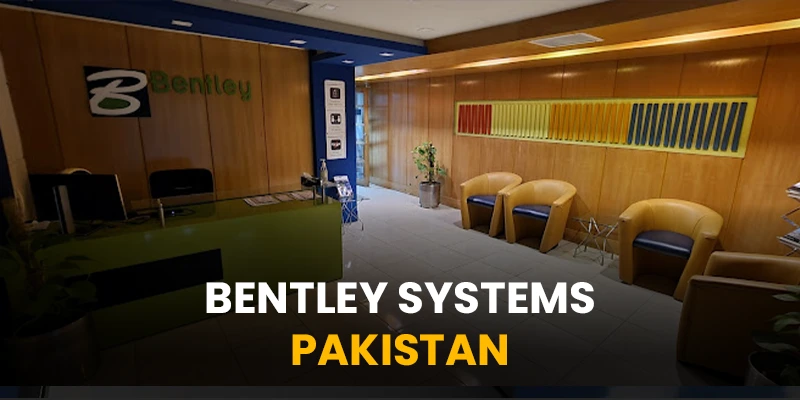
| Attribute | Details |
|---|---|
| Software House Name | Bentley Systems Pakistan (Pvt.) Ltd. |
| Founder(s) | Greg Bentley |
| Year Established | 1984 (Global Parent Company) |
| Location in Pakistan | Islamabad
Address: Suite 204, 2nd Floor, Evacuee Trust Complex, Agha Khan Road, F-5/1, Islamabad 44000, |
| Number of Employees | 101-200 |
| Core Services Offered | Infrastructure engineering software solutions, project management, design, analysis, and asset management |
| Technologies Used | – MicroStation- OpenBuildings- OpenRoads- OpenRail- Bentley ProjectWise- AssetWise |
| Clients/Industries Served | – AEC (Architecture, Engineering, and Construction)- Infrastructure and utilities industries (transportation, water, energy, and more) |
| Website Link | bentley.com |
| Contact Information | Phone: +92 51 884 2358,
+1 800-236-8539 Email: info@bentley.com support@bentley.com |
Industry Reputation
Bentley Systems Pakistan is renowned for providing advanced software solutions for infrastructure design, construction, and operations, enabling engineers and architects to efficiently deliver sustainable infrastructure projects.
Client Reviews
Bentley Systems Pakistan is highly regarded for its ability to enhance project delivery and improve efficiency in infrastructure development, with clients valuing the intelligent and sustainable approach facilitated by its software.
Project Diversity
The company supports a wide range of infrastructure initiatives by collaborating with industry partners, government agencies, and academic institutions, offering solutions that address the diverse needs of the infrastructure sector.
Trends and Innovations
Bentley Systems Pakistan is at the forefront of infrastructure engineering innovation, promoting digital workflows and leveraging cutting-edge technology to drive intelligent and sustainable infrastructure development.
16. Teradata Pakistan

| Attribute | Details |
|---|---|
| Software House Name | Teradata Pakistan (Private) Limited |
| Founder(s) | Jack E. Sheehan (Co-founder of Teradata Corporation) and Khuram Rahat,(CEO) |
| Year Established | 1979 (Global Parent Company) |
| Location in Pakistan | Islamabad, Lahore |
| Number of Employees | Approximately 300 |
| Core Services Offered | Data analytics, cloud solutions, consulting services |
| Technologies Used | Teradata Vantage platform, cloud data warehousing, analytics |
| Clients/Industries Served | Telecommunications, finance, retail, manufacturing, and other data-intensive industries |
| Website Link | teradata.com |
| Contect Informatin | Islamabad Office: Telecom Foundation Complex, 2nd Floor, 7 Mauve Area, G-9/4, Islamabad 44000 Phone: +92-51 201-1163 |
Industry Reputation
Teradata Pakistan is a leading provider of data analytics and consulting services, recognized for helping organizations unlock the full potential of their data to drive business insights, innovation, and competitive advantage.
Client Reviews
Teradata Pakistan is highly valued by clients for its ability to enhance decision-making and operational efficiency through advanced data analytics, enabling organizations to achieve substantial business growth.
Project Diversity
The company collaborates with a variety of customers and industry partners to provide tailored solutions, promoting best practices in data analytics and addressing the unique needs of different sectors.
Trends and Innovations
Teradata Pakistan is at the forefront of digital transformation, leveraging its advanced analytics platform to drive data-driven innovation and support organizations in optimizing their operations and creating value.
17. Ericsson Pakistan
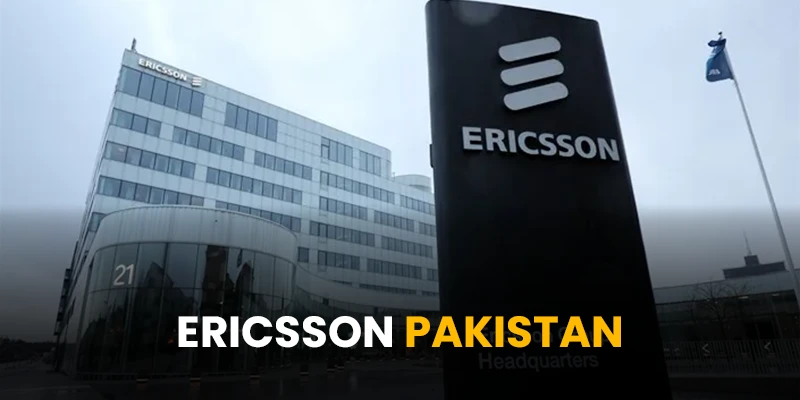
| Attribute | Details |
|---|---|
| Software House Name | Ericsson Pakistan (Private) Limited |
| Founder(s) | Lars Magnus Ericsson |
| Year Established | 1876 (Global Parent Company) |
| Location in Pakistan | Islamabad, Lahore, Karachi |
| Number of Employees | Not specified but approximately 400 |
| Core Services Offered | Telecommunications, 5G, IoT, cloud solutions, mobile infrastructure, and network services |
| Technologies Used | 5G, LTE, IoT, AI, cloud platforms, network automation |
| Clients/Industries Served | Telecommunications providers, governments, enterprises, and technology companies |
| Website Link | ericsson.com |
| Contact Information | Islamabad Office: Telecom Foundation Complex, 2nd Floor, 7 Mauve Area, G-9/4, Islamabad 44000
Phone: +92-51 201-1163 Lahore Office: C-Part Empire Centre, 2nd Floor, 9-K Gulberg-II, Lahore Phone: +92-42 525-9700 Email: asq@ericsson.com |
Industry Reputation
Ericsson Pakistan is a leading provider of telecommunications software and services, recognized for empowering communication service providers to deliver high-performance networks and innovative services that enhance customer experiences.
Client Reviews
Clients appreciate Ericsson Pakistan for its commitment to quality and reliability, as it enables access to exceptional communication services that improve overall customer satisfaction and engagement.
Project Diversity
The company works with a wide range of telecom operators, technology partners, and industry stakeholders to implement tailored solutions that address the unique challenges and needs of the telecommunications sector.
Trends and Innovations
Ericsson Pakistan is at the forefront of digital transformation, promoting advanced telecommunications technology and network evolution to build smarter, more connected societies in the digital age.
are instrumental in driving technological innovation, fostering economic growth, and promoting digital transformation in Pakistan and beyond.
Through their commitment to excellence, strategic partnerships, and continuous investment in research and development, Software Houses and Companies in Pakistan are shaping the future of the software industry and driving positive change in society.
18.DPL

| Attribute | Details |
|---|---|
| Software House Name | DPL Private Limited |
| Founder(s) | Syed Ahmad and Adnan Javed |
| Year Established | 2003 |
| Location | 3rd Floor, FDOC Plaza, I-8 Markaz Islamabad, Pakistan |
| Number of Employees | 51-200 employees |
| Core Services | Custom software development, mobile/web app development, DevOps, cloud services, cybersecurity, UI/UX design, digital transformation |
| Technologies Used | .NET, PHP, JavaScript, React, Node.js, AWS, Azure, Docker, Kubernetes, AI & ML (TensorFlow, Scikit-learn) |
| Clients/Industries Served | Healthcare, fintech, telecom, e-commerce, education; clients include Telenor, Total Parco |
| Website | dplit.com |
| Contact Email | info@dplit.com |
| Phone Numbers | Phone:+92 51 2895321 |
Industry Reputation
DPL Software House is a well-respected name in the industry, recognized for its expertise in delivering reliable and innovative digital solutions.
Known for its customer-centric approach, it stands among the top Software Houses and Companies in Pakistan.
The company’s reputation for high-quality service delivery and global clientele makes it a trusted partner for businesses seeking software development.
Client Reviews
Clients consistently praise DPL for its professionalism, timely delivery, and excellent communication.
Reviews highlight the company’s ability to provide customized solutions that meet specific business needs, making it a preferred choice among Software Houses and Companies in Pakistan.
Project Diversity
DPL Software House works across diverse industries, including:
-
eCommerce
-
Mobile App Development
-
Enterprise Software
-
FinTech
-
Healthcare IT Solutions
This wide range of expertise positions DPL as a versatile player in the Software Houses and Companies in Pakistan sector.
Trends and Innovations
DPL is at the forefront of industry trends, including:
-
Cloud Computing for scalable solutions
-
DevOps Integration for faster development cycles
-
AI and Machine Learning for automation and data-driven decisions
-
Blockchain Technology for decentralized applications
-
Mobile-First Development to meet growing mobile app demands
These innovations highlight DPL’s commitment to delivering cutting-edge solutions, solidifying its place among the top Software Houses and Companies in Pakistan.
Software House in Pakistan

A software house is a company that specializes in building and providing different software products using efficient programmer teams and IT support.
Software Houses and Companies in Pakistan can focus on business or consumer software, such as single license software or software-as-a-service (SaaS) products.
Software Houses and Companies in Pakistan can also offer ready-to-use all-around IT solutions for companies, such as setting up PC workstations, telephone services, servers, and network services.
Furthermore, a software house acts as an intermediary between end-users and manufacturers and provides reliable IT support for questions and problems.
Key Services offered by software houses and Companies
The key services offered by software houses vary depending on their specialization and expertise. Some of the common services include
Web developmentcreating websites and web applications using various technologies and frameworks, such as HTML, CSS, JavaScript, PHP, Ruby, Python, etc.
Mobile development: creating mobile applications for different platforms and devices, such as iOS, Android, Windows, etc.
Software testing: ensuring the quality and functionality of software products by performing various tests, such as unit testing, integration testing, system testing, etc.
Software maintenance: providing ongoing support and updates for software products to ensure their performance and security.
Software consultancy: providing advice and guidance on software-related issues, such as software architecture, design, development, deployment, etc.
Software outsourcing: providing software development and IT services to clients abroad, mainly in the US and Europe, at lower costs and higher quality.
Software product development: creating software products that are sold over the shelves or online, such as games, utilities, educational software, etc.
Software engineering: applying engineering principles and methods to software development, such as software analysis, design, implementation, verification, etc.
Software research and development: conducting research and development activities to create innovative and cutting-edge software solutions, such as artificial intelligence, blockchain, cloud computing, etc.
The Top Software Houses in Pakistan
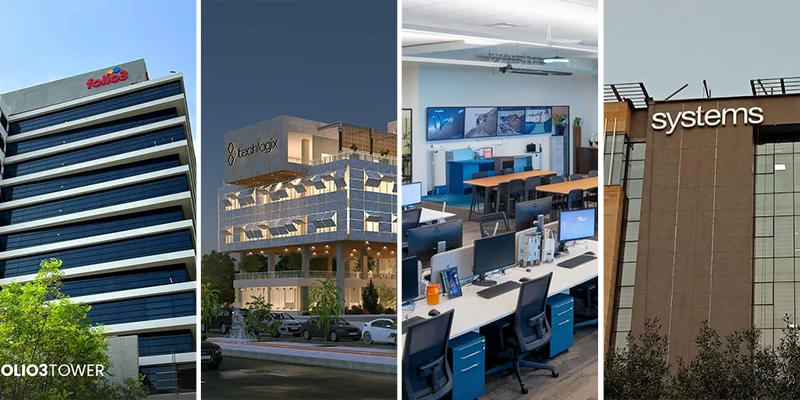
Here, we delve into the criteria used to rank these top software houses, conduct an in-depth analysis of their operations, and highlight notable achievements and projects.
Criteria for Ranking the Top Software Houses
The assessment of leading software houses involves considering several key criteria:
- Global Impact: Companies with a global footprint and international recognition are given priority.
- Specialization: Expertise in specific industries, such as finance, healthcare, or e-commerce, demonstrates a software house’s capabilities.
- Innovation: Recognition for adopting and pioneering innovative technologies sets companies apart.
- Client Satisfaction: Positive feedback and long-term client relationships are crucial indicators of a software house’s success.
- Project Portfolio: A diverse and successful project history showcases a company’s ability to deliver quality solutions.
In-depth Analysis of the Leading Software Houses in Pakistan
NetSol Technologies
- Global Presence: Offices in multiple countries, establishing a robust international footprint.
- Industry Focus: Specializes in financial services, leasing, and asset finance.
- Innovation: Acknowledged for innovative financial solutions; listed on the NASDAQ stock exchange.
- Achievements: Successful implementation of cutting-edge financial and leasing solutions globally.
Systems Limited
- Established Presence: Operating since 1977, showcasing extensive industry experience.
- Diversified Portfolio: Engaged in various industries, including healthcare, retail, and finance.
- Digital Transformation: Prioritizes digital transformation and offers enterprise solutions.
- Awards and Recognition: Received the “Best BPO Partner” award from the Global Sourcing Association (GSA).
Software Companies in Pakistan
Pakistan’s software industry has seen remarkable growth, with a diverse range of Software Houses and Companies in Pakistan contributing to its development.
This exploration delves into distinguishing Software Houses and Companies in Pakistan from software companies, provides an overview of the corporate landscape, and identifies key sectors and domains covered by these entities.
Distinguishing Software Companies from Software Houses
In the context of the Pakistani software landscape, it’s important to distinguish between Software Houses and Companies in Pakistan.
While the terms are sometimes used interchangeably, companies often engage in a broader spectrum of activities, including software development, product creation, and possibly other technology-related services.
On the other hand, Software Houses in Pakistan typically focus on custom software development and may have a more specialized scope.
Overview of the Software Industry’s Corporate Landscape
Examining the corporate landscape of Pakistan’s software industry reveals a dynamic ecosystem marked by:
- Diversity: A myriad of companies with varying sizes, scopes, and specializations, contributing to the richness of the industry.
- Innovation: Companies at the forefront of adopting new technologies, fostering innovation and pushing the boundaries of what’s possible.
- Collaboration: A culture of collaboration, where companies may partner on projects or collaborate with other industries to drive technological advancements.
- Global Presence: Companies with an expanding international footprint, showcasing Pakistan’s capabilities on the global stage.
Key Sectors and Domains Covered by Software Companies
Software companies in Pakistan operate across diverse sectors and domains, including but not limited to:
- Finance and Banking: Offering solutions for digital banking, financial analytics, and risk management.
- Healthcare: Providing software for electronic health records, medical billing, and telemedicine.
- E-commerce: Developing platforms for online retail, payment gateways, and inventory management.
- Education: Creating e-learning platforms, school management systems, and educational content.
- Telecommunications: Offering software solutions for network management, billing systems, and customer relationship management.
Challenges and Opportunities
Challenges
The software industry in Pakistan faces several challenges that hinder its growth and competitiveness, such as:
Work ethics and culture
The resistance to technology adoption and innovation among the public sector and some private sector organizations is a major obstacle for the software industry. The lack of transparency, accountability, and meritocracy also affects the quality and efficiency of software solutions1.
Lack of domain knowledge
The software industry suffers from a shortage of skilled and experienced professionals who have domain knowledge and expertise in various fields, such as finance, health, education, and agriculture. This limits the scope and diversity of software products and services.
Managerial issues and human behavior
The software industry faces various managerial challenges, such as weak human resource management, organizational politics, low employee engagement, and high turnover rates. These issues affect the productivity, creativity, and retention of software professionals.
Poor education system
The software education sector in Pakistan fails to bridge the gap between the software graduates’ skills and the needs of the software industry.
The curriculum is outdated, the teaching methods are ineffective, and the communication and interpersonal skills are neglected.
Unavailability of the Internet
The Internet penetration and speed in Pakistan are low compared to other countries. The frequent outages and disruptions of internet services affect the reliability and quality of software solutions.
Power issues
The power shortage and load shedding in Pakistan are a major challenge for the software industry.
The frequent and unpredictable power cuts affect the operations and performance of software houses and companies.
Piracy and intellectual property rights
The software industry in Pakistan faces a high risk of piracy and infringement of intellectual property rights. The weak law enforcement and judicial system,
the low awareness and respect for software copyrights, and the lack of effective anti-piracy measures affect the profitability and reputation of software houses and companies.
Opportunities
The software industry in Pakistan also offers several opportunities for growth and collaboration, such as:
Increasing demand for software solutions
The software industry in Pakistan can benefit from the increasing demand for software solutions in the domestic and international markets.
The growing sectors, such as e-commerce, e-government, e-learning, fintech, and health tech, offer potential markets for software products and services.
Availability of talent and resources
The software industry in Pakistan can leverage the availability of talent and resources in the country.
The large and young population, the low cost of labor, the improving infrastructure, and the supportive policies provide a conducive environment for software development and innovation.
Adoption of emerging technologies
The software industry in Pakistan can adopt and explore emerging technologies, such as artificial intelligence, cloud computing, blockchain, and smart city. These technologies offer new possibilities and solutions for various domains and challenges.
Globalization and collaboration
The software industry in Pakistan can globalize and collaborate with other countries and regions, such as the United States, Europe, China, and the Middle East.
These markets offer opportunities for software exports, investments, partnerships, and learning.
Government initiatives and support
The government of Pakistan has taken several initiatives and provided support for the software sector, such as:
Tax incentives and exemptions
The government of Pakistan has offered tax incentives and exemptions for the software sector, such as 100 percent ownership of equity, income tax exemption on IT export revenues, 100 percent repatriation of profits, and tax holidays for venture capital funds.
Development of software technology parks
The government of Pakistan has developed and facilitated the establishment of software technology parks across the country.
These parks provide state-of-the-art infrastructure, facilities, and services for the software industry, such as subsidized bandwidth, internet merchant accounts, and instant and reliable internet connectivity.
Promotion of research and innovation
The government of Pakistan has promoted and supported research and innovation in the software sector, such as through funding, grants, awards, and competitions.
The government has also encouraged the collaboration between academia and industry for the development and commercialization of software solutions.
Implementation of digital policies and strategies
The government of Pakistan has implemented and revised various digital policies and strategies for the software sector, such as the Digital Pakistan Policy, the National IT Policy, the National e-Commerce Policy, and the National Cyber Security Policy.
These policies and strategies aim to create a conducive and enabling environment for the Software Houses and Companies in Pakistan and to address the challenges and opportunities in the digital domain
If you want to learn more about the software industry in Pakistan, you can visit the websites of the Ministry of IT and Telecom, the Pakistan Software Export Board, and the Pakistan Software Houses Association.
Success Stories

Some of the success stories from the featured software houses and companies in Pakistan are:
Netsol Technologies
Netsol Technologies is one of the most successful Software Houses and Companies in Pakistan and internationally. It was founded by Salim Ghauri in 1995 and has grown to become a global leader in asset finance software, offering solutions for leasing, lending, fleet management, and wholesale finance.
It has offices in Pakistan, USA, UK, China, Thailand, and Australia, and serves clients in over 30 countries. It is the first and only Pakistani company to be listed on the NASDAQ stock exchange.
Arbisoft
Arbisoft is one of the leading part of Software Houses and Companies in Pakistan, specializing in web and mobile applications, data science, machine learning, and cloud computing.
It was founded in 2007 and has worked with clients such as edX, Kayak, Stanford University, and MIT. It has offices in Pakistan, USA, and UAE.
It has also developed several innovative products, such as Eyedeus Labs, a computer vision startup, and BookMe, an online ticketing platform.
10Pearls
10Pearls is an award-winning part of Software Houses and Companies in Pakistan that offers end-to-end digital solutions, including product development, user experience design, quality assurance, and artificial intelligence.
It was founded in 2004 and has offices in Pakistan, USA, UAE, Canada, and Colombia. It has been recognized in the Inc.5000 list of fastest-growing private companies in America.
It has worked with clients such as National Geographic, Discovery, and Nextel.
As one of the top Software Houses and Companies in Pakistan, 10Pearls continues to drive innovation and deliver exceptional digital services across various industries globally.
Folio3
Folio3 is one of the part of Software Houses and Companies in Pakistan that focuses on enterprise applications, e-commerce, mobile apps, and cloud solutions.
It was founded in 2005 and has offices in Pakistan, USA, Canada, and UAE. It has worked with clients such as eBay, PayPal, Netgear, and Stanford University.
It has also created several successful products, such as Animal Stackers, a popular mobile game, and DynAX, a mobile CRM app.
VentureDive
VentureDive is one of the part of Software Houses and Companies in Pakistan that provides tech solutions for various industries, such as healthcare, education, fintech, and e-commerce.
It was founded in 2012 and has offices in Pakistan, UAE, and UK. It has created products such as Bykea, a ride-hailing and delivery app, Airlift, a smart bus service, and Sastaticket.pk, an online travel portal.
It has also partnered with global companies such as Careem, Daraz, and Jazz.
FAQs
1. What is the biggest Software Houses and Companies in Pakistan?
The biggest Software Houses and Companies in Pakistan is Netsol Technologies, known for its global presence and leadership in asset finance software.
2. Which is Pakistan’s first Software Houses and Companies in Pakistan?
Pakistan’s first Software Houses and Companies in Pakistan is Systems Limited, which paved the way for the IT industry’s growth in the country.
3. Which company is best for software engineers in Software Houses and Companies in Pakistan?
Companies like Netsol, Systems Limited, and 10Pearls are highly regarded by software engineers in Software Houses and Companies in Pakistan for their growth opportunities and technical challenges.
4. How much do Software Houses and Companies in Pakistan pay?
Salaries in Software Houses and Companies in Pakistan range from PKR 40,000 to PKR 250,000 per month, depending on experience and role.
5. Which company is no. 1 in Software Houses and Companies in Pakistan?
Netsol Technologies is often considered the number one Software Houses and Companies in Pakistan, leading in innovation and global presence.
Conclusion
Pakistan’s technology sector is transforming rapidly, driven by a young, talented population and an enabling regulatory environment. Software Houses and Companies in Pakistan have attracted significant investment, but face challenges like political instability and skill shortages.
The dynamic ecosystem of Software Houses and Companies in Pakistan offers vast opportunities for growth and innovation.
With the right support, these companies can drive digital transformation and impact.
We encourage readers to explore this emerging ecosystem of Software Houses and Companies in Pakistan and the potential it holds.
